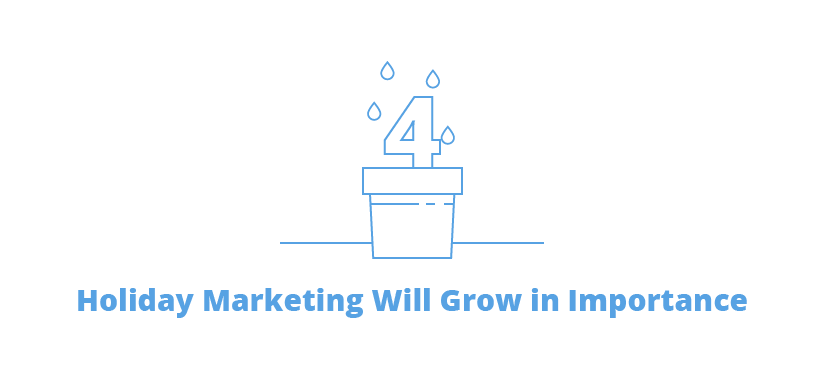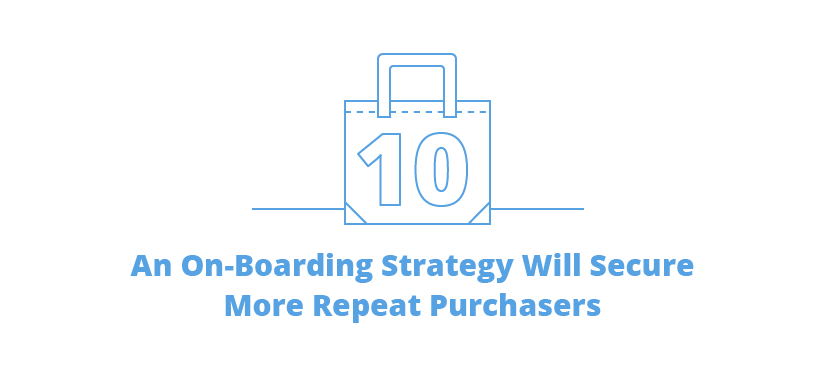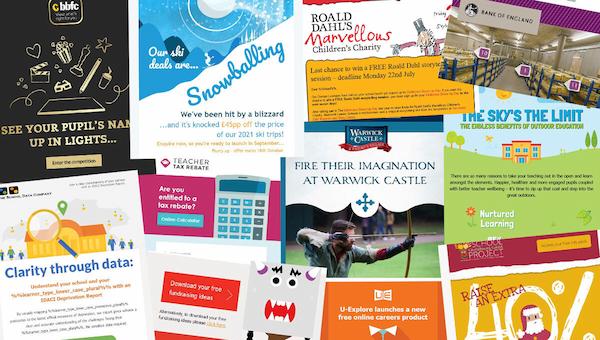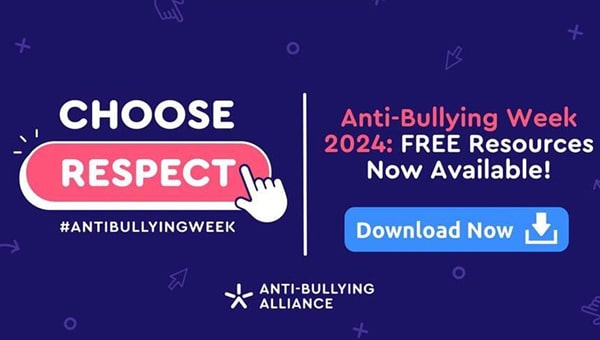Marketing to Schools in 2017: 10 Game-Changing Trends
Marketing to Schools in 2017: 10 Game-Changing Trends
Here’s our rundown of the 10 most important trends to have on your marketing to schools radar in 2017…
Here’s our rundown of the 10 most important trends to have on your marketing to schools radar in 2017…
 Towards the end of 2016 we published some truly staggering marketing to schools stats about how nearly 50% of teachers are now viewing your emails on mobile devices. Even more importantly though, our research also showed that teachers who opened non-responsive emails on mobile spent an average of just 2 seconds reading the content – that’s 6 seconds less than those teachers that opened the same email on desktop.
Towards the end of 2016 we published some truly staggering marketing to schools stats about how nearly 50% of teachers are now viewing your emails on mobile devices. Even more importantly though, our research also showed that teachers who opened non-responsive emails on mobile spent an average of just 2 seconds reading the content – that’s 6 seconds less than those teachers that opened the same email on desktop.
The above statistic represents a massive opportunity for you to better engage your audience with your marketing to schools in 2017. We’ve found that our responsive email designs are generating nearly 4% better click-to-open rates for our clients by helping them better engage that 50% of teachers viewing their emails on mobile.
We predict that 2017 will be the year that our clients truly embrace responsive email designs in their marketing to schools and see their campaign engagement stats soar as a result!
 Designing and building responsive emails is no picnic. In fact, we’ve seen some of the so-called responsive emails that clients have had designed for them by other agencies and they look frankly horrible when viewed on mobile devices (and one thing worse than a non-responsive email is a broken responsive email!).
Designing and building responsive emails is no picnic. In fact, we’ve seen some of the so-called responsive emails that clients have had designed for them by other agencies and they look frankly horrible when viewed on mobile devices (and one thing worse than a non-responsive email is a broken responsive email!).
At Sprint Education we’ve made a huge investment in training up our Coding Team to be responsive design experts but we understand that this is a luxury most sellers to schools simply don’t have. That’s why we’ve spent the last few months developing another marketing to schools first; a Drag ‘n’ Drop Responsive Email Builder that enables our Campus users to create marketing emails that only the most seasoned email design pros could have dreamt of before (with no training required whatsoever!).
If you’d like to find out more, give us a call and we can set you up with a free trial or demonstration.
 The ripple effect caused by more teachers viewing emails on mobile devices has brought about some interesting developments, one of which is the diminishing importance of ‘the fold’. In recent years, email marketers have become obsessed with the fold when marketing to schools, believing that teachers' shrinking attention spans mean that they have to ensure their call to action buttons are visible without recipients having to scroll down the email.
The ripple effect caused by more teachers viewing emails on mobile devices has brought about some interesting developments, one of which is the diminishing importance of ‘the fold’. In recent years, email marketers have become obsessed with the fold when marketing to schools, believing that teachers' shrinking attention spans mean that they have to ensure their call to action buttons are visible without recipients having to scroll down the email.
However, on mobile devices scrolling is actually a lot easier than clicking and something that most of us do without even thinking about it! Teachers have become so used to scrolling and swiping that the fold is becoming less and less of a consideration. To prove this point, we’ve carried out some A/B split testing with our own marketing recently and found that the version of the email with the call to action below the fold actually outperformed the above the fold version on every single occasion.
In 2017, rather than fixating on the fold with your marketing to schools, find ways to encourage teachers to scroll down the email instead.
 Yet another unexpected, yet very welcome, knock-on effect of teachers going mobile has been the diminishing importance of the academic year calendar when marketing to schools. In short, you should no longer think of your education marketing as being restricted to part of the year, but instead expand your marketing strategy to encompass the entire year.
Yet another unexpected, yet very welcome, knock-on effect of teachers going mobile has been the diminishing importance of the academic year calendar when marketing to schools. In short, you should no longer think of your education marketing as being restricted to part of the year, but instead expand your marketing strategy to encompass the entire year.
Long gone are the days when teachers would only open your emails during the school day. Now they are interacting with you 52 weeks of the year; morning, noon, and night! In the last few months we’ve seen an increasing number of our clients embrace marketing to schools on breaks or during the summer holidays, and analysis of those campaigns has shown that engagement levels remain almost identical to engagement during term time – averaging open rates of 27% and click-to-open rates of almost 10%!
In 2017, we predict we’ll see further blurring of the lines between the school year and holidays as teachers continue to interact with their inboxes all year round.
 We recently left a client flabbergasted when we mentioned that we had over 17,000 education businesses in our CRM. How did we find all of these companies? Where did we buy our lists from? They simply couldn’t believe it when we said that we have never bought any lists; all of the education businesses in our CRM have found us and opted into our marketing.
We recently left a client flabbergasted when we mentioned that we had over 17,000 education businesses in our CRM. How did we find all of these companies? Where did we buy our lists from? They simply couldn’t believe it when we said that we have never bought any lists; all of the education businesses in our CRM have found us and opted into our marketing.
Since then we’ve been asking our clients about their Search Engine Optimisation (SEO) strategies and the feedback we’re getting is that the vast majority are not putting anywhere near enough emphasis on this. And, if this sounds like you, then you’re probably missing out on the greatest opportunity to steal a march on your competitors and increase your teacher followers.
Simply put; a good SEO strategy will ensure that your website is ranked at the top when teachers search for certain keywords and what they see will make them want to click through to your website. For many it can seem like a bit of dark art; relying on Page Titles, Meta Descriptions, URLs, Headers, Alt Text and much more.
It’s a pretty meaty subject but a potential game-changer in 2017 so, if you’d like to discuss this with one of our experts, just drop us a line!
 As part of the onboarding we do for our Campus users, we’ll often examine their website to identify how it can be improved in terms of lead generation. What we’ve found is that, in almost all instances, not nearly enough effort is being made to convert web traffic into subscribers. Yes, there is the obligatory Contact Us form on the website but let’s face it, only a small percentage of teachers that land on your website for the first time are going to want you to get in touch with them.
As part of the onboarding we do for our Campus users, we’ll often examine their website to identify how it can be improved in terms of lead generation. What we’ve found is that, in almost all instances, not nearly enough effort is being made to convert web traffic into subscribers. Yes, there is the obligatory Contact Us form on the website but let’s face it, only a small percentage of teachers that land on your website for the first time are going to want you to get in touch with them.
In 2017 we’re going to focus on educating more of our clients about how to use prominent free resources on their websites in order to capture the details of web visitors before they slip away into the ether (take a look at our website if you’d like to see a good example of what I’m talking about – the free download on our Home Page generates between 60 – 90 new leads every single month!).
I can’t stress enough how getting this right can transform your business in 2017. Not only will it enable you to start generating a steady stream of new leads on a daily basis, it will also decrease your dependency on comparatively expensive outreach marketing campaigns.
 The most important trend, in terms of content, in recent years has been the emergence of relationship marketing; the idea that teachers don’t need marketing, they need relationships with people that can help them solve their daily challenges. And I’m glad to say that many of our clients are now embracing this style of marketing; creating helpful free teaching resources and writing in a much more personable style.
The most important trend, in terms of content, in recent years has been the emergence of relationship marketing; the idea that teachers don’t need marketing, they need relationships with people that can help them solve their daily challenges. And I’m glad to say that many of our clients are now embracing this style of marketing; creating helpful free teaching resources and writing in a much more personable style.
However, the clients that are seeing the best results from their marketing to schools are the ones that are taking this a step further and embracing a spirit of complete transparency. Amongst other things this means getting rid of all those bland stock images on your website, pushing your team members into the spotlight on your social media posts, and ensuring that you’re writing regular blog posts that provide a real insight into your company culture and show what happens behind the scenes in your offices.
Teachers will only put their faith in you if they feel like they know who you are. So, if you’re a small or medium sized family business (like Sprint Education) then shout this out from the rooftops instead of hiding behind stock images that say nothing about who you are and what gets you fired up about working in education.
 Big Data was a big deal a couple of years ago. It was all about how you should be making your marketing to schools more relevant and personalised for every teacher that receives it by utilising context data such as school ratings, results, and the % of FSM students. In 2017 Big Data will make a major comeback, this time in terms of what is working and what isn’t working when it comes to the marketing that you’re sending.
Big Data was a big deal a couple of years ago. It was all about how you should be making your marketing to schools more relevant and personalised for every teacher that receives it by utilising context data such as school ratings, results, and the % of FSM students. In 2017 Big Data will make a major comeback, this time in terms of what is working and what isn’t working when it comes to the marketing that you’re sending.
This means tracking every open, click, response, sale, and then analysing how these things differ based on variables such as the day/time the email was sent, the device teachers used to view it, the style of the content, who it was sent to, and much more. In simple terms it will transform your marketing from an unpredictable art into a data driven science.
And if this sounds like a heck of a lot of work then you’re absolutely right! However, fear not, the Sprint Education team is hard at work on a humongous data project that will put this information at the fingertips of every education business. Watch this space!
 Following on neatly from Big Data, what do you do when you have this wealth of information about what’s delivering the best results when emailing teachers? You turn it into an automated process that you can easily roll out to every single new sales lead of course!
Following on neatly from Big Data, what do you do when you have this wealth of information about what’s delivering the best results when emailing teachers? You turn it into an automated process that you can easily roll out to every single new sales lead of course!
To do this, you need to know two key things; what types of behaviour you need to encourage from teachers in order for them to buy from you, and secondly which emails perform best at encouraging them to do these things. Once you know these things you can then set up an automated series of email campaigns that is going to transform your success rate for converting new subscribers into new clients.
In 2017 our Campus Team will be working on their next big software development project; The Pathways Module, which is going to enable all of our Campus users to put email automation at the centre of how they build relationships with teachers and ultimately make more sales.
 On-boarding is the process by which you welcome new clients on board and help them to get the very best from what you offer and fall in love with your brand. In short, it is the single most important factor in terms of converting one-off purchasers into lifelong brand advocates. A little over a year ago we released our new marketing and sales software, Campus, and boy oh boy have we learned a lot about the importance of on-boarding since then!
On-boarding is the process by which you welcome new clients on board and help them to get the very best from what you offer and fall in love with your brand. In short, it is the single most important factor in terms of converting one-off purchasers into lifelong brand advocates. A little over a year ago we released our new marketing and sales software, Campus, and boy oh boy have we learned a lot about the importance of on-boarding since then!
In the early days, because Campus is relatively simple to use, we would give users access to a Knowledgebase (containing over 100 useful help articles) and then largely leave them to their own devices. However, our Support Team would then usually receive a drip-feed of calls and emails in the following weeks from users who had encountered some small difficulty.
The result was that, not only was this time consuming for our Support Team, it was also really slowing down the pace with which our clients were being able to get the best out of the software. In short, this onboarding process wasn’t working effectively for us or our clients.
Since then we’ve spent a lot more time examining how we on-board our new Campus users and the result is that we’re now putting a lot more emphasis on how we help new users get up and running with the software in those first few weeks. It’s a little more time intensive initially; however it has all but eradicated that drip-drip of support calls further down the line. We’ve also seen that these users are using the software more and using it better, meaning they’re much more likely to become lifelong users and advocates of the software.
The cost of acquiring a new customer is estimated to be six times higher than the cost of keeping an existing one, so it’s well worth taking another look at your on-boarding strategy in 2017 and seeing how you can create a better first impression for new clients. It could very well sky-rocket how much you sell to schools in the medium-long term!
Tags
Email Teachers
Emailing Schools
Emailing Teachers
How to Sell to Schools
Marketing to Schools
Selling to Schools
Similar Articles
The Top 3 EdTech Needs in Schools (and How You Can Transform Teachers' Lives)
Revealed: What teachers think are the main benefits of EdTech and how you can engage with their key needs.
Read PostGathering education insights (8 quick tips)
Learn 8 quick tips to improving your education marketing strategies with direct school insights, and the benefits of online studies and surveys.
Read Post
















































